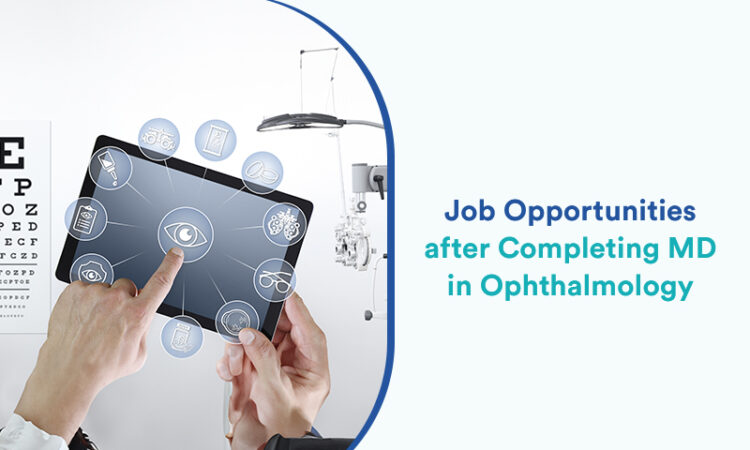
MD in Ophthalmology is a three-year postgraduation degree in medical sciences. It includes the comprehensive study of anatomy, physiology, and disorders that affect the eyes. The course focuses on providing specialized training to aspiring ophthalmologists in complete eye care ranging from fundamentals of ophthalmology to performing intricate and delicate surgical procedures.
Hence, Ophthalmologists treat eye conditions and illnesses along with various ophthalmic procedures.
Career Prospects and Job Opportunities for Ophthalmologists
The branch of ophthalmology is a growing and dynamic specialty. There are wide career prospects for Ophthalmologists and some are mentioned below:
Practice as Ophthalmologist: You can work as an Ophthalmic practitioner in any healthcare facility, may it be Government or Private hospital. You can join as an ophthalmologist in a Trust/Charitable hospital, NGO, or Organ Donation facility.
Academics: You can pursue superspecialty courses, fellowship courses, and short fellowship courses in the ophthalmology specialty. These courses are specifically dedicated to clinical and surgical exposure maximizing the opportunity for research and career. Going for FAICO and ICO fellowships will escalate your success to heights in this very field. The list of Ophthalmic subspecialties includes Neuro-ophthalmology, cataract, cornea, uvea, pediatric, strabismus, retina, ocular-immunology, oculoplastics, etc.
Government Service: You can work as Medical Officer, Deputy Medical Officer, or Assistant Divisional Medical Officer at several central and state government facilities depending upon the vacancy. Medical professionals also have an opportunity to work in PHC and CHC.
Private Practice: You can choose private practice as a career option. For private practice, you can establish a new ophthalmology setup or join in an established setup, or work collaboratively. This is one of the best options for having a flexible and highly lucrative career.
Pursue Masters: You also have the option to pursue MBA or MPH if you are interested in administration or consultations.
Join National and International Organisations: You can also apply at a national or international organization like WHO, UNICEF, CARE, and more as a medical consultant, medical officer, or for any related vacancy you are interested in.
Research: You also have an option to pursue a Ph.D. program if you want to pursue a career in research or join any Research organization or lab to work as a Clinical Researcher or Medical Consultant.
Academician: Becoming a Professor/Lecturer is a highly respected and lucrative career option. You get an opportunity to teach aspiring doctors and shape their careers.
Job Profiles
- Ophthalmologist
- Professor
- Clinical Researcher
- Medical Consultant
- Ophthalmic Surgeon
- Eye and Lasik Specialist
- Pediatric Ophthalmologist
- Cornea Specialist
- Cataract Surgeon
- Neuro-ophthalmic surgeon
- Oculoplastic Specialist
Requirements to Become a Successful Ophthalmologist
You must learn the following qualities, knowledge, and skills to become a skilled and successful Ophthalmologist:
- Should have a fundamental understanding of the human body’s structure, function, and development as it relates to ophthalmology, as well as of the variables that can interfere with these systems and the diseases of structure and function, and must be familiar with the fundamentals of medical law.
- Able to practice and manage the majority of common day-to-day issues on your own.
- Able to comprehend how the environment affects health and be conversant with the epidemiology of at least some of the field’s most prevalent illnesses in ophthalmology.
- Offer the general public the current level of ‘standard care’ in ocular diagnostics as well as therapies, whether medical or surgical, in the majority of circumstances faced at the level of health services.
- Should be able to collaborate with other colleagues and specialists to create educational courses in ophthalmology and should be conversant with contemporary teaching and assessment techniques.
- Should be able to choose a research issue, design a logical course of action to solve it, carry it out, and critically assess his or her results in the context of prior knowledge.
- Arrive at the findings using logical inference and should be able to evaluate the relevance and trustworthiness of the evidence.
- knowledgeable about patient counselling and appropriate consent-taking.
To enhance your level of understanding and increase your expertise in the field, you can enroll in Ophthalmology online courses. One of the good PG ophthalmology courses is the Ophthalmology MD course, designed by Dr. N. Venkatesh Prajna along with India’s 55 renowned faculty. The course is a thoughtful compilation of topics from academic, clinical, and surgical perspectives. The online Ophthalmology MD course comprises highly illustrative video lectures, concise notes, practice questions, surgical videos with 3D animated sequences, case discussions and demonstrations, and more.



